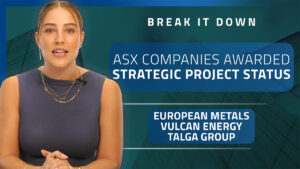MoneyTalks: Seneca’s CEO picks three green stocks to keep high on your watchlist

Pic: Stevica Mrdja / EyeEm / EyeEm via Getty Images
Money Talks is Stockhead’s regular drill down into what stocks investors are looking at right now. We’ll tap our extensive list of experts to see what’s hot, their top picks and what they’re looking out for.
Today, we hear from Luke Laretive, chief executive officer and investment advisor at Seneca Financial Solutions.
What’s hot right now?
Laretive sees great potential in companies focused on green, socially responsible enterprise.
“As a society and as humanity we tend to focus our efforts, innovation, and money in the areas where the returns are potentially the highest,” he said.
“But I suppose the difference now is that investors are interested first in the ethics and then the financial return and that has been a shift over the last five or so years.
“It is something we have seen across the client base for a number of years, but it has only really hit the mainstream in the last 18 months.”
He said that impact investing – where investments are made into companies and organisations with the intention to generate a measurable social or environmental impact alongside a financial return – is driving down the cost of capital for companies in this space.
“MSCI, a global indexing business based out of New York, has calculated that the current differential between first quintile ESG-scoring companies and fifth quantile ESG companies is 39 basis points.
“This demonstrates that companies with high ESG scores are creating sustainable, competitive advantage, particularly for those companies with high upfront capex requirements – such as in the mining or infrastructure sectors where much of the energy sector is.”
Top picks
On that note, his first pick is packaging giant Amcor (ASX:AMC).
“It might not immediately spring to mind when we think about environmentally friendly companies, but the global leader is a good example of how a company in a traditionally ‘dirty’ industry can transform itself into a green business,” he said.
“Amcor has committed to making all its packaging recyclable or reusable by 2025 and to reducing its CO2 emissions by 60% by 2030 – which they have already pretty much done.”
While the company still has some room for improvement in terms of operational waste and water usage, he said AMC’s management now sees sustainability as central to their business.
“They are aiming to progress from a negative impact on our environment, to becoming a net positive in the long term.
“From an investment perspective, Amcor is a globally exposed cyclical with a defensive earnings growth outlook enhanced by the global economic recovery trading on 14 times its next 12-month earnings and below its five-year average price earnings by 15 times, despite accelerating forecast free cash flow, earnings and dividend growth.”
Another one of Laretive’s picks is De.Mem (ASX:DEM).
This Singapore-Australian industrial wastewater company has a blue-chip customer base, reoccurring revenue, and quality management, he said.
“DEM has found success growing revenues both organically and through acquisition, extracting both cost and sales synergies from those deals and increasing margins.”
He said the stock is trading 2.5 times higher than forecast revenues and breaking even (for now).
And lastly Laretive named Vulcan Energy Resources (ASX:VUL) as a potentially good investment opportunity.
The company is the owner of the Zero Carbon Lithium Project in Germany’s Upper Rhine Valley, where it promises to produce both renewable electricity and lithium on a ‘carbon negative’ basis from deep geothermal wells.
However, the market darling has caught the wrong side of investor attention lately over a particular report.
In the report titled ‘Vulcan: God of Empty Promises’, Murray claimed the project “may never get underway: the costs are higher than the company claims, and the environmental impact is brutal enough that public outcry will block permits.”
“The company has only increased its transparency and disclosure since that report came out,” he said.
“Around 85% of production has already been contracted to Tier-1 customers, it’s run by a high-calibre team, and the stock is trading at 50% discount to short term fair value and even deeper discount to NPV at spot prices.”
The views, information, or opinions expressed in the interviews in this article are solely those of the interviewee and do not represent the views of Stockhead.
Stockhead does not provide, endorse or otherwise assume responsibility for any financial product advice contained in this article.
Related Topics
UNLOCK INSIGHTS
Discover the untold stories of emerging ASX stocks.
Daily news and expert analysis, it's free to subscribe.
By proceeding, you confirm you understand that we handle personal information in accordance with our Privacy Policy.








